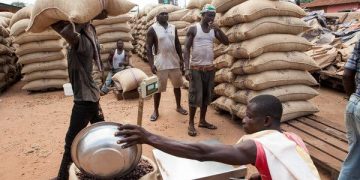The Ghana Catholic Bishops Conference has expressed deep worry about what it describes as the unbearable economic pressure confronting Ghanaian households, saying the rising cost of living is crippling families, distorting livelihoods, and weakening the moral fibre of society.
In a detailed communiqué released after its 2025 Plenary Assembly held in Damongo, the Conference urged government under President John Dramani Mahama to confront the economic hardship with bold, transparent, and people-centered strategies.
According to the bishops, the struggles of many families have worsened despite recent signs of marginal relief in the exchange rate and inflation. They noted that while the cedi had shown some stability in recent months, the stabilisation was not being felt in markets, shops, transport fares, school fees, or utility bills. The statement observed that the price of food, rent, medical care, water, and electricity remains a nightmare for the average Ghanaian.
The bishops stated that they were consistently hearing desperate cries from parishioners across the country who can no longer afford basic necessities. The communiqué noted that some parents can no longer provide three meals a day for their families, while others are being forced to withdraw their children from school because of rising costs. It added that even public workers who earn regular salaries now struggle to keep up with monthly expenses.
The Conference indicated that the poor and vulnerable were the hardest hit and that many of them feel abandoned by a system that is supposed to protect them. The bishops wrote that an economy that does not protect the weak and offer real opportunities to the young will eventually collapse under its own weight.
The bishops called on government to take steps that translate macroeconomic data into real-life improvements. “We urge government to ensure that the relative stability of the cedi leads to an actual reduction in the prices of goods and services,” the Conference stated. They stressed that economic indicators are meaningless to citizens unless they reflect in the cost of food, housing, transportation, health care, and education.
They appealed for stronger regulation of essential commodity prices, especially food items that continue to rise uncontrollably due to factors ranging from transportation to market speculation. The bishops also urged government to widen the local manufacturing base to reduce overreliance on imports, which worsens fragility in the economy.
The communiqué further called for urgent reforms in the agricultural sector. It stressed that a country with vast arable land should not be facing food insecurity or rising food costs. The bishops wrote that Ghana’s agriculture needs consistent investment in irrigation, extension services, storage facilities, and farm-to-market roads to reduce post-harvest losses and improve food availability.
The Conference also expressed concern about the high unemployment rate, especially among the youth. The communiqué emphasized that the despair of unemployed young people is a national security threat and that Ghana cannot afford to lose an entire generation to despondency. The bishops urged government to strengthen the private sector through deliberate incentives that help businesses grow and absorb labour.
They also touched on the increasing migration of young Ghanaians through dangerous routes to Europe and North Africa. The bishops described these journeys as heartbreaking tragedies that reflect the severity of hopelessness at home. They said young people must have reasons to believe in Ghana again.
The communiqué urged government, policymakers, civil society, and faith-based institutions to collaborate in rebuilding trust and strengthening the social contract. The bishops stated that national progress requires collective sacrifice, transparency, and honesty on the part of leaders.
The 2025 Plenary Assembly was hosted at St Anne Cathedral in Damongo and the communiqué was signed by Most Rev. Matthew Kwasi Gyamfi, Bishop of Sunyani and President of the Conference.
Source: www.kumasimail.com



































































